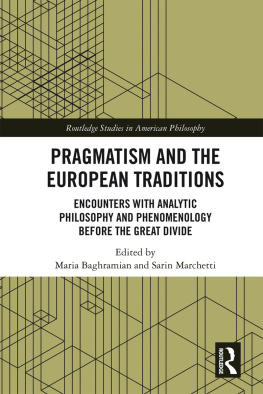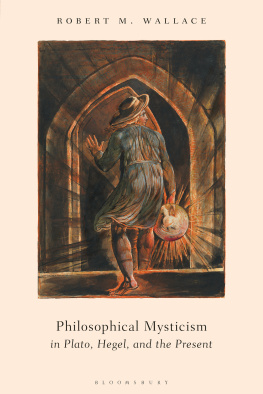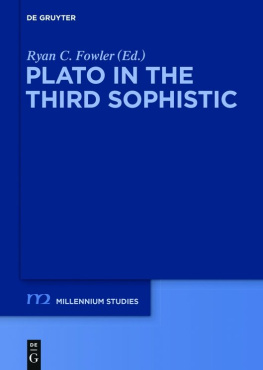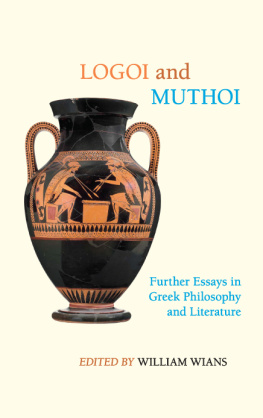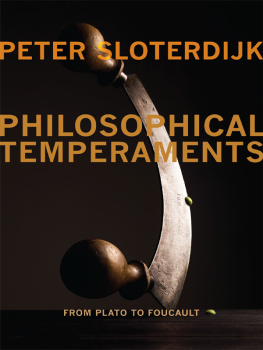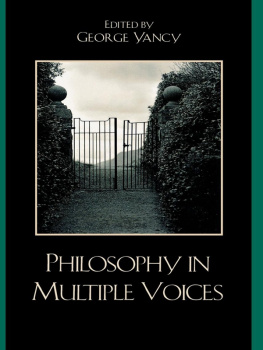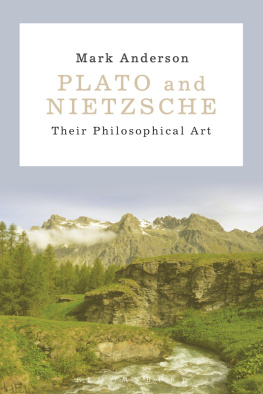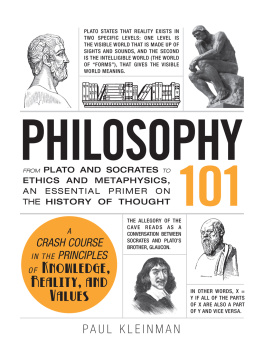Sophistical Practice

Copyright 2014 Fordham University Press
All rights reserved. No part of this publication may be reproduced, stored in a retrieval system, or transmitted in any form or by any meanselectronic, mechanical, photocopy, recording, or any otherexcept for brief quotations in printed reviews, without the prior permission of the publisher.
Fordham University Press has no responsibility for the persistence or accuracy of URLs for external or third-party Internet websites referred to in this publication and does not guarantee that any content on such websites is, or will remain, accurate or appropriate.
Fordham University Press also publishes its books in a variety of electronic formats. Some content that appears in print may not be available in electronic books.
Library of Congress Control Number: 2014932516
Printed in the United States of America
16 15 14 5 4 3 2 1
First edition
CONTENTS
Earlier versions of parts of this book have previously appeared in print. Toward a New Topology of Philosophy was first published as Philosophical Displacements: Interview with Barbara Cassin, in Three French Philosophers Interviewed by Penelope Deutscher, Womens Philosophy Review , no. 24 (2000): 3456. Penelope Deutscher and I continued and actualized this interview in 2012. Whos Afraid of the Sophists? Against Ethical Correctness appeared in Hypatia 15, no. 4 (Fall 2000): 10220. Speak If You Are a Man, or the Transcendental Exclusion was published in Terror and Consensus: Vicissitudes of French Thought , edited by Jean Joseph Goux and Philip R. Wood (Stanford: Stanford University Press, 1998). Topos/Kairos : Two Modes of Invention will be published by Michael McDonald on the new Oxford Handbooks website. Time of Deliberation and Space of Power: Athens and Rome, the First Conflict appeared in JavnostThe Public 12, no. 4 (2005): 3944. From Organism to Picnic: Which Consensus for Which City? was published in Angelaki 11, no. 3 (2006): 2138. Aristotle with and Against Kant on the Idea of Nature appeared in French Women Philosophers: A Contemporary Reader , edited by Christina Howells (London: Routledge, 2004, pp. 100121). Paradigms of the Past in Arendt and Heidegger appeared in Comparative Civilizations Review 22 (Fall 1990): 2853. How to Really Do Things with Words: Performance Before the Performative was first published in French in Gense de lacte de parole , edited by Barbara Cassin and Carlos Lvy (Turnhout: Brpols, 2011, pp. 113147). The Performative Without Condition: A University sans appel , which I cowrote with Philippe Bttgen, appeared in Radical Philosophy 162 (July/August 2010): 3137. Genres and Genders. Woman/Philosopher: Identity as Strategy was published in Women Philosophers Journal , UNESCO, no. 1 (2011): 2537. Philosophising in Languages appeared in Nottingham French Studies 49, no. 2 (Summer 2010): 1728. Enough of the Truth For was originally published in French in La Vrit , edited by Bernard Van Meenen (Brussels: Publications des Facults Universitaires Saint-Louis, 2006, pp. 6375). Politics of Memory appeared in JavnostThe Public 8, no. 3 (2001): 922. Google and Cultural Democracy was first published in French as a chapter in my book Google-moi: La deuxime mission de lAmrique (Paris: Albin-Michel, 2007, pp. 240251). The Relativity of Translation and Relativism appeared in CR: The New Centennial Review 12, no. 1 (Spring 2012): 2345. Permission to reprint is gratefully acknowledged.
I would like to thank Anthony Padgen for his help in revising Rhetorical Turns in Ancient Greece, Wim van Binsbergen for his revision of the translation of Politics of Memory, Andrew Goffey as the philosophizing translator, Jennifer Cazenave for her eyes and last hand, Penelope Deutscher, Emily Apter, Jacques Lezra, and Bachir Diagne, who encouraged me to work in English.
Sophistical Practice
Barbara Cassin, with Penelope Deutscher
I dont know how to approach, why not say it, the truthno more than woman. I have said that the one and the other are the same thing, at least to man.
JACQUES LACAN, Encore
July 1998
PENELOPE DEUTSCHER : In your work, and particularly in Leffet sophistique ( The Sophistic Effect ) a sophistic history of philosophy. Can you describe this?
BARBARA CASSIN : The sophistic history of philosophy is a history of neglected and repressed traditions, of alternative paths. It is essential to have a plurality instead of a single path. That single, dominant path of ontology goes from Parmenides to Plato via a certain reading of Aristotle up to Heidegger. Im interested in showing how it goes even up to Habermas, who might seem to be different but belongs to the ontological tradition; he rejects the same things and people as Plato and Aristotlein particular the sophistic and everything that might look like it. The history of philosophy, the royal road, as history of ontology and phenomenology or as history of communication, cannot be traced or even identified as a path unless one looks, from an outside perspective, at what was, even materially, left to one side.
Sophistic texts are the paradigm of what was not only left to one side but transformed and made unintelligible by their enemies. Imagine you were trying to reconstruct a dinosaur from a few small bones and that these bones had been chewed up by the dinosaurs foes. My work is thus a paleontology of perversion.
To be able to modify the perception we have of the great conceptual history of philosophy and of the royal road of ontology and phenomenology, we have to look elsewhere and even outside philosophy. Philosophy has organized things so that any critique of the royal road is rejected as not being philosophy. And you have to keep working on authors who are difficult to identify, like Anaximander, so praised by Heideggerbut my question is, can one be pre-Socratic in another way?
These others have in common another way of speaking, even another conception of logos .
I found a very simple model and countermodel, perhaps also a little caricaturish. The model is Parmenidess Poem and Platonico-Aristotelian ontology, and the countermodel is the sophistic. Parmenidean ontology is wonderfully analyzed by Heidegger. He shows the connection, the cobelonging between being and speaking: to speak is to speak Being. To be, to think and to say are one and the same. That leads directly to Unterwegs zur Sprache ( On the Way to Language ) and to the way in which a human being is entrusted with the Being There ( Dasein ) who will speak Being.
The countermodel, I no longer call it ontology but
So, sophistics, for me, is a discourse that is primarily and above all performative. It is not a matter of saying what is but of making what one says be . One is in a completely different model from that of the physico-ontological model, say, where the concern is to account for physis , or being, whatever name is used. In the second model, discourse is a great tyrantto use Gorgiass phraseand creates as it speaks. Now, the first performance is the polis . So one finds the opposition between physics and politics reworked.
With sophistics, one passes from physics to politics, from philosophy to literature. All that against the background of a basic discordance, which is the discordance between ontology and logology. I say all this to explain that in my view, one cant work in the mainstream without at the same time working on the countermodels and without working on philosophys others.
So obviously, I need numerous traditions, a new geography. I also need the long-term perspective to see what resurgences of antiquity appear in modernity, for example, to see how the regime of discourse forbidden by Aristotle in book Gamma of the Metaphysics reappears via Freud and Lacan via sophistics, that is, via the possibility of homonymy and the signifier.
Next page


